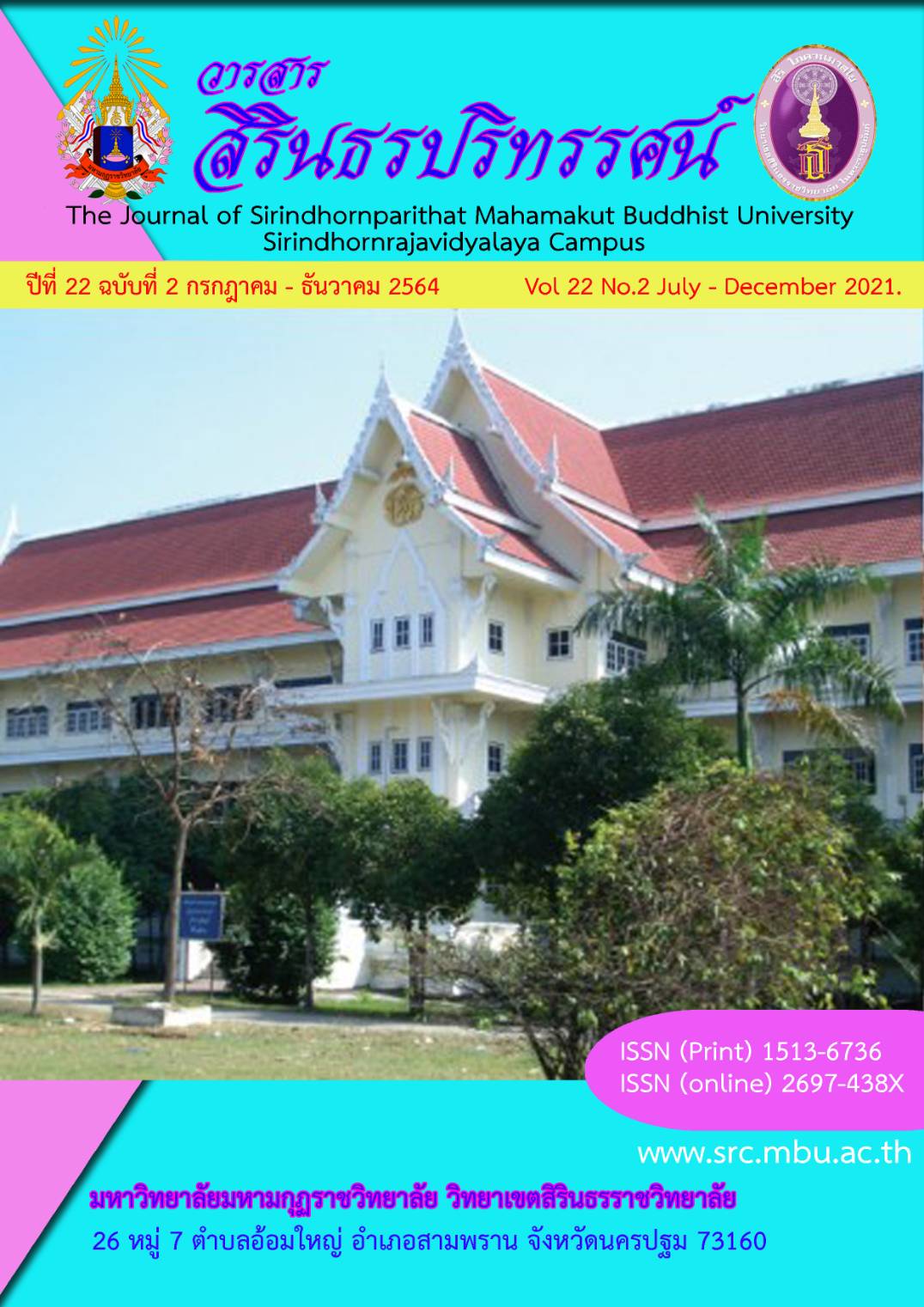THE PARTICIPITIVE EDUCATIONAL MANAGEMENT ACCORDING TO SAŃGAHAVATTHU 4 OF SCHOOL ADMINISTRATORS UNDER THE OFFICE OF PRACHINBURI EDUCATIONAL SERVICE AREA 2
Keywords:
participative educational management, Sangahavatthu 4Abstract
The objectives of this research were: to study the state of participative educational management according to Sangahavatthu principles of school administrators under Office of Prachinburi Educational Service Area 2, to study and propose the guideline in participative educational management according to Sangahavatthu principles of school administrators under Office of Prachinburi Educational Service Area 2. The mixed research methods were used in the study. The quantitative data were collected by questionnaires from 291 samples and analyzed by frequency, percentage, mean and standard deviation. The qualitative data were obtained from interviews with 5 experts through semi-interview form and then analyzed by content analysis.
The results of the study found that:
The state of participative educational management according to Sangahavatthu principles of school administrators under Office of Prachinburi Educational Service Area 2 indicated that; In Dana, the administrators give supervision and build cooperation from the concerned, In Piyavaca, the administrators have sense of humour, In Atthacariya, the administrators are sincere, honest, transparent and able to be examined, and In Samanattata, the administrators manage the work based on facts and correct information.
The guideline in participative educational management according to Sangahavatthu principles of school administrators under Office of Prachinburi Educational Service Area 2 is that; In Dana, the administrators should have generosity in 4 aspects, In Piyavaca, the administrators should have nice speech in 4 aspects, In Atthacariya, the administrators should create advantages in 4 aspects, and In Samanattata, the administrators should have equal treatment in 4 aspects.
References
กระทรวงศึกษาธิการ, (2546). พระราชบัญญัติการศึกษาแห่งชาติพุทธศักราช ๒๕๔๒ แก้ไข เพิ่มเติม (ฉบับที่ ๒) พุทธศกราช ๒๕๔๕. กรุงเทพมหานคร : คุรุสภา.
ธนสาร บัลลังปัทมา, (2552). คู่มือการบริหารโรงเรียนสถานศึกษาขั้นพื้นฐาน ตาม พ.ร.บ. การศึกษาแห่งชาติ พิมพ์ครั้งที่ ๒. นครสวรรค์ : ริมปิงการพิมพ์.
ธีระ รุญเจริญ, (2546). การบริหารโรงเรียนยุคปฏิรูปการศึกษา. กรุงเทพมหานคร: ข้าวฟ่าง.
พรชัย ภาพันธ์, (2547). เมื่อโรงเรียนเป็นนิติบุคคล ทุกคนต้องพร้อมที่จะเปลี่ยนแปลง.วารสารวิชาการ.1 มกราคม-มีนาคม 2547,44.
สำนักงานปฏิรูปการศึกษา, (2543). พระราชบัญญัติการศึกษาแห่งชาติ พ.ศ. ๒๕๔๒.กรุงเทพมหานคร : คุรุสภาลาดพร้าว.
สุภาพร รอดถนอม, (2542). ความสัมพันธ์ระหว่างภาวะผู้นำการเปลี่ยนแปลง และการบริหารแบบมีส่วนร่วมของผู้อํานวยการวิทยาลัยพยาบาล กับประสิทธิผลองค์การ ตามการรับรู้ ของอาจารย์พยาบาล วิทยาลัยพยาบาล สังกัดกระทรวงสาธารณสุข. วิทยานิพนธ์ หลักสูตรปริญญาพยาบาลศาสตรมหาบัณฑิต สาขาวิชาการบริหารการพยาบาล จุฬาลงกรณ์มหาวิทยาลัย.
สุวิมล ว่องวาณิช, (2558). การวิจัยประเมินความต้องการจำเป็น. กรุงเทพมหานคร: สำนักพิมพ์แห่งจุฬาลงกรณ์มหาวิทยาลัย บริษัท วี. พริ้นท์ (1991) จำกัด.
อภิชาติ ศรีสารคาม, (2554). การศึกษาแนวทางการพัฒนาการใช้อินเทอร์เน็ตเพื่อการศึกษาของครู ในโรงเรียนสังกัดสำนักงานเขตพื้นที่การศึกษาประถมศึกษามหาสารคาม เขต ๓.วิทยานิพนธ์ .มหาวิทยาลัยมหาสารคาม.
Knezevich. S. J, (1984). Administration of Public Education. 4 th ed. New York: Harper and Row.
Tannenbaum.R..and Schmidt, (1961) W.H.How to Choose a Leadership Pattern. Boston: Harvard Business Review.
Downloads
Published
Issue
Section
License
Copyright (c) 2022 Mahamakut Buddhist University

This work is licensed under a Creative Commons Attribution-NonCommercial-NoDerivatives 4.0 International License.
บทความที่ได้รับการตีพิมพ์เป็นลิขสิทธิ์ของ มหาวิทยาลัยมหามกุฏราชวิทยาลัย วิทยาเขตสิรินธรราชวิทยาลัย
ข้อความที่ปรากฏในบทความแต่ละเรื่องในวารสารวิชาการเล่มนี้เป็นความคิดเห็นส่วนตัวของผู้เขียนแต่ละท่านไม่เกี่ยวข้องกับหาวิทยาลัยมหามกุฏราชวิทยาลัย วิทยาเขตสิรินธรราชวิทยาลัย และคณาจารย์ท่านอื่นๆในมหาวิทยาลัยฯ แต่อย่างใด ความรับผิดชอบองค์ประกอบทั้งหมดของบทความแต่ละเรื่องเป็นของผู้เขียนแต่ละท่าน หากมีความผิดพลาดใดๆ ผู้เขียนแต่ละท่านจะรับผิดชอบบทความของตนเองแต่ผู้เดียว




